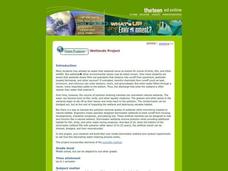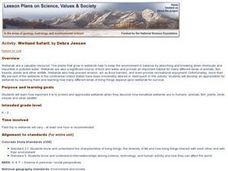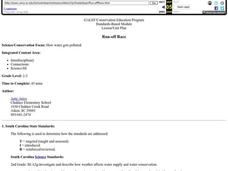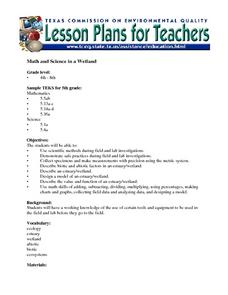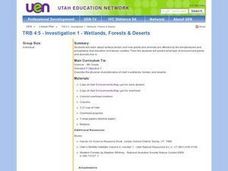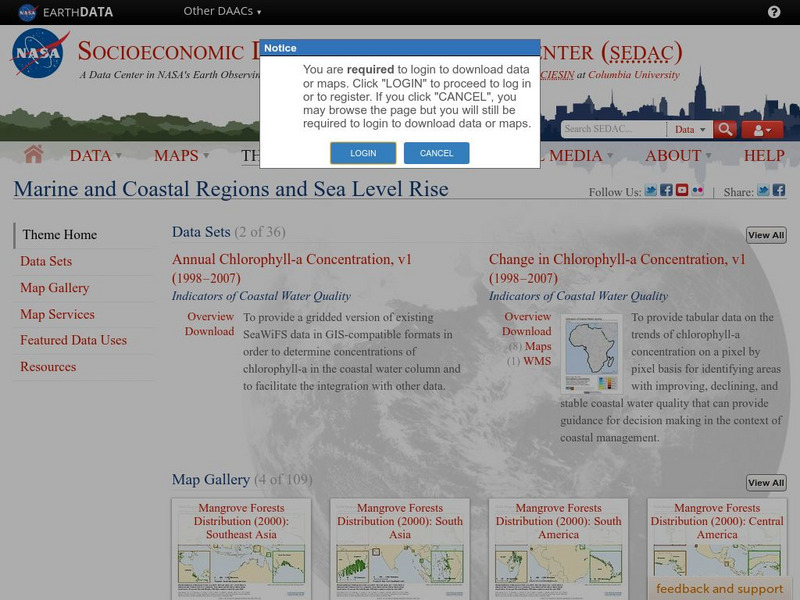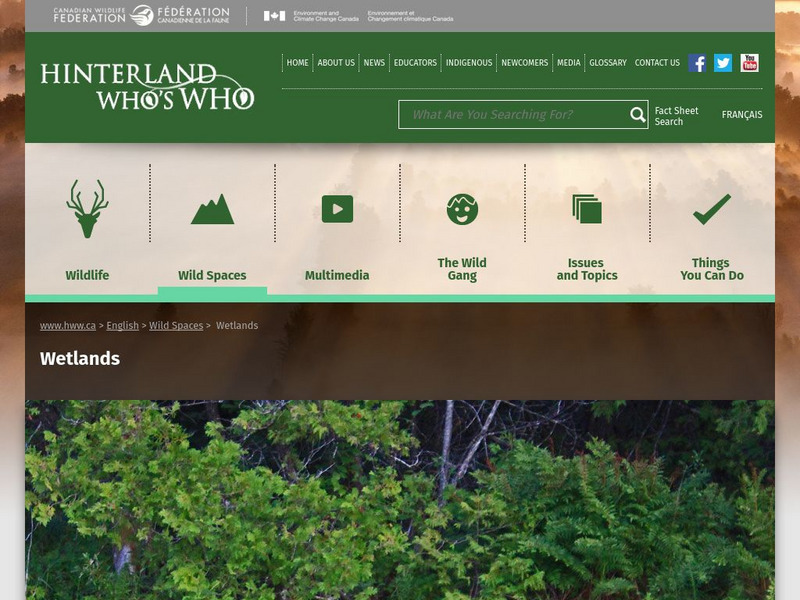Curated OER
Wetlands Project
Students discover how wetlands filter out contaminants before they can reach other bodies of water. In groups, they design and build a model of a stormwater wetland. They test the water quality and inform their classmates about the...
Curated OER
Wetland Safari!
Students identify how humans, fish, plants, birds, insects and other wildlife benefit from wetland environments. They observe a wetland and its inhabitants, draw a migration map that represents how birds use wetlands in traveling long...
Curated OER
Run-off Race
Students create wetland models in pans and use them to experiment to see how plants help slow the flow of runoff water and keep our waterways clean.
Curated OER
Wetlands Project
Students analyze wetlands data and create a HyperStudio stack to present the information. In small groups they analyze the wetlands data already collected in a previous lesson plan, and construct a stack of cards using HyperStudio to...
Curated OER
Wetlands in Danger
Fifth graders investigate the characteristics of wetlands. They conduct Internet research, complete a class KWL chart, and write a persuasive essay as a final project.
Curated OER
Math and Science in a Wetland
Students describe safe practice when doing field and lab investigations in a estuary or wetland. They create a model of an estuary and describe their value and function. They participate in field study in which they collect and analyze...
Curated OER
Hopscotch Migration
Students examine the use of wetlands by migrating birds. They discuss reasons for the disappearance of wetlands. They discover how humans have affected wetlands as well.
Curated OER
Wetlands/Watershed Model
Students work together to create a watershed model. They discover the flow of surface water on different topography. They examine how materials originate from miles away and end up in a different wetland.
Curated OER
Storage, Use, Pollution,& Clean Up of Water
Students synthesize water resource educational posters into class presentations based on the poster's theme. Working in groups, they make presentations on wastewater, water uses, watersheds, groundwater, wetlands,water quality, and...
Curated OER
Water Quality
Students conduct experiments to study the quality of water. They examine how pollutants get into and affect the water supply in this unit.
Curated OER
Arkansas and Louisiana Purchase Wetlands
Pupils experiment to determine the value and importance of wetlands in Arkansas. They develop an environmental appreciation for wetlands.
Curated OER
Exploring Our Watershed System
Students examine how watershed systems are made up, and visit the Susquehanna watershed system and map out the system. They evaluate the order of watercourses in their area.
Curated OER
Investigation 1 - Wetlands, Forests & Deserts
Fourth graders examine surface terrain and how plants and animals are affected by the temperatures and precipitation that elevation and terrain creates. Then students predict what type of environment plants and animals live in.
Curated OER
Loss of Wetlands: Subsidence
Students observe subsidence and the effect it has on wetlands with a classroom demonstration. They think about the impact of global warming and the sea level and how it affects the marsh.
Curated OER
Wetlands/Watershed Model
Students make a model that will demonstrate the flow of surface water across the land in Texas and how materials that originate many miles away can end up in the wetland along the coast.
Curated OER
Hopskotch Migration
Students understand the use of the wetlands by migrating birds and identify causes for disappearance of the wetlands.
Columbia University
Nasa: Sedac: Marine and Coastal Regions and Sea Level Rise
[Free Registration/Login Required] A collection of fifteen data sets from SEDAC (Socioeconomic Data and Applications Center) that examine the impact rising sea levels is having on marine and coastal regions. They look at mangrove...
Columbia University
Nasa: Sedac: Water Resources and Consumption
[Free Registration/Login Required] A collection of twenty-four data sets from SEDAC (Socioeconomic Data and Applications Center) that examine water resources and issues around the world. They look at dams and reservoirs, floods, drought,...
The Wild Classroom
The Wild Classroom: Biomes of the World: Wetlands Biome
Learn about wetlands ecosystems. Find out about plants, animals, adaptations, and conservation efforts.
University of Guelph
What Are Wetlands?
Wetlands are an important part of our ecosystem. They are often called the kidneys of the land. Learn about wetlands, where they are located, their value, and what threatens them.
University of Florida
Florida Museum of Natural History: About the Florida Everglades
Everything you always wanted to know about the Everglades! The Florida Museum of Natural History offers great photos and good information on the many habitat types to be found there.
American Institute of Biological Sciences
Action Bioscience: Loss of Wetlands: How Bird Communities Are Affected
With increased deforestation, invasive species, and other human actions harming or eliminating the wetland habitats the bird populations are decreasing. Scientists are working diligently to restore the wetland birds' habitats.
Canadian Wildlife Federation
Hinterland Who's Who: Wetlands
Learn about Canada?s wetlands, what they are and where they are located. Wetlands are divided into two classes: freshwater and saltwater. They are further separated into four main types: ponds, marshes, swamps, and peatbogs. Discover the...
Encyclopedia of Earth
Encyclopedia of Earth: Botany: Mangrove Ecology
Extensive article on mangroves. Covers classification, physical characteristics, life cycle, habitat, economic value, and natural and human threats to their survival.


